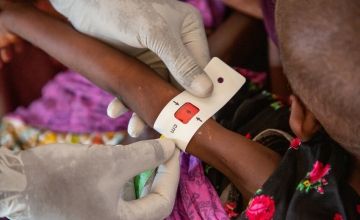
Read our 2023 annual report

Knowledge Hub
Concern statement in response to Somalia crisis report by the IPC

In response to the latest report by the Integrated Food Security Phase Classification (IPC), which said that Somalia did not reach “IPC Phase 5 Famine” levels between October and December 2022, Concern’s head of international programmes, Carol Morgan, said:
“The situation facing 7.8 million people in Somalia is deteriorating by the day.
"That famine has been averted is an unexpected finding of the IPC report. This does not mean that famine has been prevented. It does not indicate that the humanitarian response and wider efforts to date have been sufficient.
"The situation is severe, and will continue to worsen as the drought extends into 2023. Food and water prices will continue to rise and displacement due to the harsh conditions and ongoing military offensives will drive more people to seek assistance in overwhelmed urban areas.
"Humanitarian actors face immense constraints on resources and security, and there is limited possibility that these constraints can be addressed with the required urgency to allow for the necessary scale of response.
"Somalia is facing the Jilaal a season (January-March) when even in normal weather conditions most water points (except deep boreholes) and the two rivers dry up. These harsh conditions will further worsen the humanitarian situation and the avoidable loss of many more lives.
"As parts of the country are already at risk of running out of water completely, the only message to the international community should be that help must come and it must come quickly.
"Insufficient data and limited sampling are enormous challenges; many areas cannot be assessed due to access challenges. It is rarely possible to have a true picture of the scale of hunger crises.
"The picture that we can see is catastrophic.
"Following the hunger crises in 2011 and 2016, we drew lessons that more lives could have been saved with sufficient timely unrestricted funding that allowed us to reach people in greatest need. It is unacceptable that these lessons are being ignored.
"The Humanitarian Response Plan for 2022 is just 55% funded, leaving a shortfall of over $1 billion. It is unconscionable that the humanitarian response has not been fully funded.
"Famine is a powerful word, a word that can save lives when used at the right time. But whether a famine is declared is immaterial to those who have already died of starvation, and for those wasting away due to a lack of access to food today.
"Simply put, more funding must be made immediately available to agencies responding with communities in great distress or many more people will die.”
ENDS
For more information or interview requests, please contact Kevin Jenkinson at kevin.jenkinson@concern.net
Other ways to help
Corporate support
Is your company interested in working together for a common cause?
Fundraise for Concern
From mountain trekking to marathon running, cake sales to table quizzes, there are lots of ways you can support our work.
Buy a gift
With an extensive range of alternative gifts, we have something to suit everybody.
Leave a gift in your will
Leave the world a better place with a life-changing legacy.
Volunteer with Concern
The lots of ways to get involved with our work as a volunteer
School fundraising
Without the generous support from schools, we wouldn't be able to do the work that we do.

